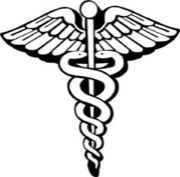ディフィシル菌関連腸炎(C-diff colitis 米語発音:シーディフ・コライタス)、抗体物質、特にクリンダマイシン(Clindamycin)を使うと繁栄しやすいばい菌、ディフィシル菌が起こす病気。(ディフィシル菌は、英語で略されてC-diffと呼ばれる)
C-diffには毒を発生するのとそうでないのとがあって、下痢(C-diff diarrhea)から、毒を発生する方は偽膜、Pseudomembrane(米語発音:シュードメンブレイン)といって、黄色い膜のようなものを作ったり、Megacolon、大腸を膨れ上がらして大変なことを起こす。
(C-diff colitisについての詳細はこちら Emedicine: Pesudomembraneous colitis http://
「下痢」を起こしているだけなら、治療しない方がいいのか、した方がいいのか。C-diff Colitisに使えるお薬はどれがいいのだろうか、と、この二つの質問が下記では取り上げられている。
記事はCochrane Reviewからです。Evidence based medicineに役に立つと思います。フリーアクセスの記事を取り上げました。4月にアップデートされたものです。
アメリカでは、今は、メトロニタゾール(Metronidazole、Flagyl)か、バンコマイシン(Vancomycin)がよく使われていると思う。下の記事はたまたま見かけたもので、エヴィデンスのレベルが記されていないけれど、Teicoplanin(発音分かんない〜タイコプラニンかな?)、値段は高いし、アメリカにはないけれど、副作用が少ないらしい。
http://
Background
Clostridium difficile (C. difficile) is recognized as a frequent cause of antibiotic-associated diarrhea and colitis.
Objectives
The aim of this review is to establish the efficacy of antibiotic therapy for C. difficile-associated diarrhea (CDAD), to identify the most effective antibiotic treatment for CDAD in adults and to determine the need for stopping the causative antibiotic during therapy.
Search strategy
MEDLINE (1966 to 2006), EMBASE (1980 to 2006), Cochrane Central Database of Controlled Trials and the Cochrane IBD Review Group Specialized Trials Register were searched using the following search terms: "pseudomembranous colitis and randomized trial"; "Clostridium difficile and randomized trial"; "antibiotic associated diarrhea and randomized trial".
Selection criteria
Only randomized, controlled trials assessing antibiotic treatment for CDAD were included in the review. Probiotic trials are excluded. The following outcomes were sought: initial resolution of diarrhea; initial conversion of stool to C. difficile cytotoxin and/or stool culture negative; recurrence of diarrhea; recurrence of fecal C. difficile cytotoxin and/or positive stool culture; patient response to cessation of prior antibiotic therapy; sepsis; emergent surgery: fecal diversion or colectomy; and death.
Data collection and analysis
Data were analyzed using the MetaView statistical package in Review Manager. For dichotomous outcomes, relative risks (RR) and 95% confidence intervals (CI) were derived from each study. When appropriate, the results of included studies were combined for each outcome. For dichotomous outcomes, pooled RR and 95% CI were calculated using a fixed effect model, except where significant heterogeneity was detected, at which time the random effects model was used. Data heterogeneity was calculated using MetaView.
Main results
Twelve studies (total of 1157 participants) involving patients with diarrhea who recently received antibiotics for an infection other than C. difficile were included. The definition of diarrhea ranged from at least two loose stools per day with an associated symptom such as rectal temperature > 38 oC, to at least six loose stools in 36 hours. Eight different antibiotics were investigated: vancomycin, metronidazole, fusidic acid, nitazoxanide, teicoplanin, rifampin, rifaximin and bacitracin. In paired comparisons, no single antibiotic was clearly superior to others, though teicoplanin, an antibiotic of limited availability and great cost, showed in some outcomes significant benefit over vancomycin and fusidic acid, and a trend towards benefit compared to metronidazole. Only one placebo controlled trial was done and no conclusions can be drawn from it due to small size and classification error. Only one study investigated synergistic antibiotic combination, metronidazole and rifampin, and there was no advantage to the drug combination.
Authors' conclusions
Current evidence leads to uncertainty whether mild CDAD needs to be treated. Patients with mild CDAD may resolve their symptoms as quickly without treatment. The only placebo-controlled study shows vancomycin's superior efficacy. However, this result should be treated with caution due to the small number of patients enrolled and the poor methodological quality of the trial. The Johnson study of asymptomatic carriers also shows that placebo is better than vancomycin or metronidazole for eliminating C. difficile in stool during follow-up. If one does decide to treat, then two goals of therapy need to be kept in mind: improvement of the patient's clinical condition and prevention of spread of C. difficile infection to other patients. Given these two considerations, one should choose the antibiotic that brings both symptomatic cure and bacteriologic cure. In this regard, teicoplanin appears to be the best choice because the available evidence suggests that it is better than vancomycin for bacteriologic cure and has borderline superior effectiveness in terms of symptomatic cure. Teicoplanin is not readily available in the United States, which must be taken into account when making treatment decisions in that country.
This version first published online: January 24. 2005
Date of last subtantive update: April 24. 2007
C-diffには毒を発生するのとそうでないのとがあって、下痢(C-diff diarrhea)から、毒を発生する方は偽膜、Pseudomembrane(米語発音:シュードメンブレイン)といって、黄色い膜のようなものを作ったり、Megacolon、大腸を膨れ上がらして大変なことを起こす。
(C-diff colitisについての詳細はこちら Emedicine: Pesudomembraneous colitis http://
「下痢」を起こしているだけなら、治療しない方がいいのか、した方がいいのか。C-diff Colitisに使えるお薬はどれがいいのだろうか、と、この二つの質問が下記では取り上げられている。
記事はCochrane Reviewからです。Evidence based medicineに役に立つと思います。フリーアクセスの記事を取り上げました。4月にアップデートされたものです。
アメリカでは、今は、メトロニタゾール(Metronidazole、Flagyl)か、バンコマイシン(Vancomycin)がよく使われていると思う。下の記事はたまたま見かけたもので、エヴィデンスのレベルが記されていないけれど、Teicoplanin(発音分かんない〜タイコプラニンかな?)、値段は高いし、アメリカにはないけれど、副作用が少ないらしい。
http://
Background
Clostridium difficile (C. difficile) is recognized as a frequent cause of antibiotic-associated diarrhea and colitis.
Objectives
The aim of this review is to establish the efficacy of antibiotic therapy for C. difficile-associated diarrhea (CDAD), to identify the most effective antibiotic treatment for CDAD in adults and to determine the need for stopping the causative antibiotic during therapy.
Search strategy
MEDLINE (1966 to 2006), EMBASE (1980 to 2006), Cochrane Central Database of Controlled Trials and the Cochrane IBD Review Group Specialized Trials Register were searched using the following search terms: "pseudomembranous colitis and randomized trial"; "Clostridium difficile and randomized trial"; "antibiotic associated diarrhea and randomized trial".
Selection criteria
Only randomized, controlled trials assessing antibiotic treatment for CDAD were included in the review. Probiotic trials are excluded. The following outcomes were sought: initial resolution of diarrhea; initial conversion of stool to C. difficile cytotoxin and/or stool culture negative; recurrence of diarrhea; recurrence of fecal C. difficile cytotoxin and/or positive stool culture; patient response to cessation of prior antibiotic therapy; sepsis; emergent surgery: fecal diversion or colectomy; and death.
Data collection and analysis
Data were analyzed using the MetaView statistical package in Review Manager. For dichotomous outcomes, relative risks (RR) and 95% confidence intervals (CI) were derived from each study. When appropriate, the results of included studies were combined for each outcome. For dichotomous outcomes, pooled RR and 95% CI were calculated using a fixed effect model, except where significant heterogeneity was detected, at which time the random effects model was used. Data heterogeneity was calculated using MetaView.
Main results
Twelve studies (total of 1157 participants) involving patients with diarrhea who recently received antibiotics for an infection other than C. difficile were included. The definition of diarrhea ranged from at least two loose stools per day with an associated symptom such as rectal temperature > 38 oC, to at least six loose stools in 36 hours. Eight different antibiotics were investigated: vancomycin, metronidazole, fusidic acid, nitazoxanide, teicoplanin, rifampin, rifaximin and bacitracin. In paired comparisons, no single antibiotic was clearly superior to others, though teicoplanin, an antibiotic of limited availability and great cost, showed in some outcomes significant benefit over vancomycin and fusidic acid, and a trend towards benefit compared to metronidazole. Only one placebo controlled trial was done and no conclusions can be drawn from it due to small size and classification error. Only one study investigated synergistic antibiotic combination, metronidazole and rifampin, and there was no advantage to the drug combination.
Authors' conclusions
Current evidence leads to uncertainty whether mild CDAD needs to be treated. Patients with mild CDAD may resolve their symptoms as quickly without treatment. The only placebo-controlled study shows vancomycin's superior efficacy. However, this result should be treated with caution due to the small number of patients enrolled and the poor methodological quality of the trial. The Johnson study of asymptomatic carriers also shows that placebo is better than vancomycin or metronidazole for eliminating C. difficile in stool during follow-up. If one does decide to treat, then two goals of therapy need to be kept in mind: improvement of the patient's clinical condition and prevention of spread of C. difficile infection to other patients. Given these two considerations, one should choose the antibiotic that brings both symptomatic cure and bacteriologic cure. In this regard, teicoplanin appears to be the best choice because the available evidence suggests that it is better than vancomycin for bacteriologic cure and has borderline superior effectiveness in terms of symptomatic cure. Teicoplanin is not readily available in the United States, which must be taken into account when making treatment decisions in that country.
This version first published online: January 24. 2005
Date of last subtantive update: April 24. 2007
|
|
|
|
|
|
|
|
Medical English-Japanese 更新情報
-
最新のアンケート
-
まだ何もありません
-
Medical English-Japaneseのメンバーはこんなコミュニティにも参加しています
人気コミュニティランキング
- 1位
- 暮らしを楽しむ
- 75488人
- 2位
- 音楽が無いと生きていけない
- 196031人
- 3位
- 独り言
- 9044人
























